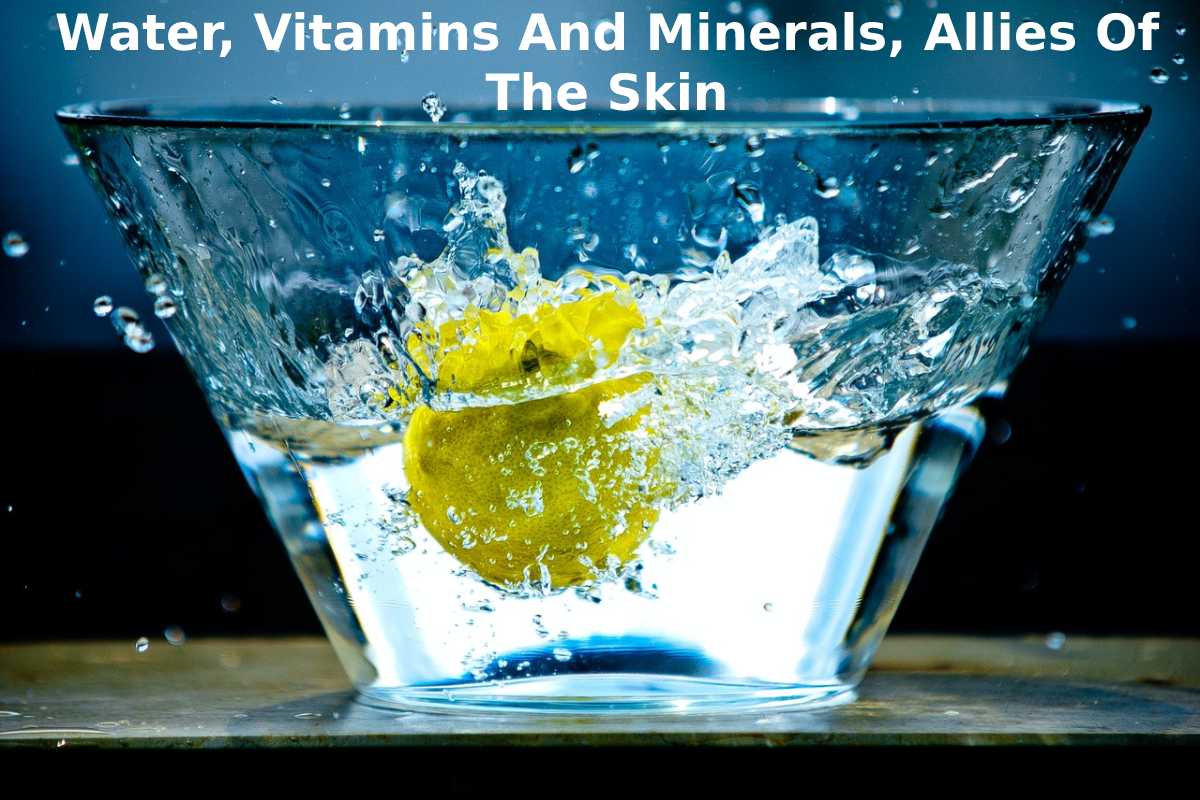Water, Vitamins And Minerals, Allies Of The Skin – Tell me what you think of first: beauty or health? The care of the dermis and epidermis is something we must take care of every day as something more than a simple cosmetic ritual.
It is important to see it more as a lifestyle, which is not limited to treating the outer part but starts from the inside, in how we eat and hydrate. If you think that just applying creams and lotions is enough, I invite you to learn about several key elements of a healthy diet to show off the healthy and beautiful skin.
Table of Contents
The Unique Needs Of The Skin
The skin is the most visible and largest organ of our body. It can cover about 2m² and represent 1/6 of our body weight in adults.
Being so extensive delicate, this wrapper made up of several layers is a complex system that connects us with caresses, with the soft and the rough, with the pain of a prick. Our first line of defense is to block viruses and bacteria and regulate body temperature.
Skincare depends a lot on whether we lead a healthy life. Although hereditary factors and suffering from skin disorders such as psoriasis, acne or dermatitis can force us to take extreme measures for its recovery and protection, the truth is that it implies other factors that you should pay attention
Did you know that every 28 days, we shed our skin? If we stored the epidermis cells that we eliminate throughout our lives, the total number of dead cells would weigh something like 100 kilos. It is a lot! Now, to carry out this constant renewal more efficiently, the body needs nutrients and plenty of water.
If these are not enough, the appearance of the skin begins to alter; wrinkles appear, freshness is lost. It becomes weaker, gets sick or has a harder time fighting external factors such as sun exposure, air pollution, temperature changes, tobacco toxins.
Water: Essential Nutrient – Allies Of The Skin
Drinking enough water every day and eating foods that contain it in large quantities are essential to take care of the skin. Most fruits and vegetables provide 90 grams of water as a nutrient for every 100 grams of their weight. So you must eat them daily and drink 1.3 liters of water every day.
Allies Of The Skin – It will help your allies Of The skin stay hydrated, and your metabolism will eliminate toxins that affect the skin’s appearance faster.
Key Trace Elements
Because of this Foods rich in healthy fats are vital for your skin to remain balanced and smooth. The monounsaturated fatty acids of avocado or olive oil and the polyunsaturated fats of blue fish, seed oils, and oily nuts provide texture and elasticity to the skin layers.
Also, nuts, vegetable oils, wheat germ, whole grains, and various green leafy vegetables are rich in vitamin E. This nutrient has antioxidant action and helps fight free radicals that attack the skin when exposed to the sun.
Ideal Vitamins For Skin Care
If we could choose the ideal vitamins for our skin, what would they be? It is the top of those that directly influence your skincare and health:
Pro-vitamin A: Also called beta-carotene, it is found in green leafy vegetables and orange, red or yellow vegetables and fruits such as pumpkins, peppers, carrots, mangoes, peaches, cherries, apricots and melon. The skin of free radicals.
Vitamin A: So helps the skin and mucous membranes renew and remain balanced. It is very present in foods of animal origin, such as dairy products, liver, cream, butter and egg yolk.
Lycopene: present in tomato, papaya, watermelon, pink grapefruit, apricot and apple pulp, lycopene is an antioxidant pigment of great benefit to the skin.
Vitamin C: is intimately linked to the production of collagen and youth in the skin. It found in high quantities in fruits and vegetables such as cabbage, peppers, strawberries, mango, kiwi, melon, blackberries, lemon, orange, tomato.
Complex B: this group of vitamins (B9, B2, B3, B5 and B6) are directly involved in cell renewal:
- B9 (folic acid): you get it in green leafy vegetables, fortified cereals, liver and brewer’s yeast.
- B2 (riboflavin): can help fight seborrhea. Include it by eating yoghurt, cheese, eggs, fish, legumes, nuts, almonds, liver.
- B3 (niacin) is essential to synthesize keratin. It present in whole grains dried fruits such as dates and figs—fish meat and viscera.
- B5 (Pantothenic Acid): You can find it in beef, chicken, eggs, whole grains, and vegetables like avocados, potatoes, and broccoli.
- B6 (pyridoxine): oily fish, eggs, meat, spinach, whole grains, bananas and many other foods are rich in B6, essential for the epidermis and zinc metabolism.
Minerals On The Honor Roll
Minerals occupy another place of honor in allied nutrients in skincare. Among the most outstanding we have:
Iron: If you lack iron, your skin will look pale. Green leaves, cereals, meats, organ meats, fish and nuts are the ones that contain it the most.
Selenium: Too Great antioxidant power can reduce the risk of melanomas and other skin tumors. It so found in many berries and vegetables and red and white meats.
Zinc: It is integrated into the composition of the skin. So it is key to its balance. In organ meats, eggs, red meat, legumes, and whole grains, you get it naturally.
Sulphur: So helps optimize keratin synthesis. Eggs, milk, cereals and brewer’s yeast are rich in this mineral.
I do not want to close this post without reminding you to include quality vegetable and animal origin proteins. They are other front-line allies for skincare. So do not stop eating protein daily!

